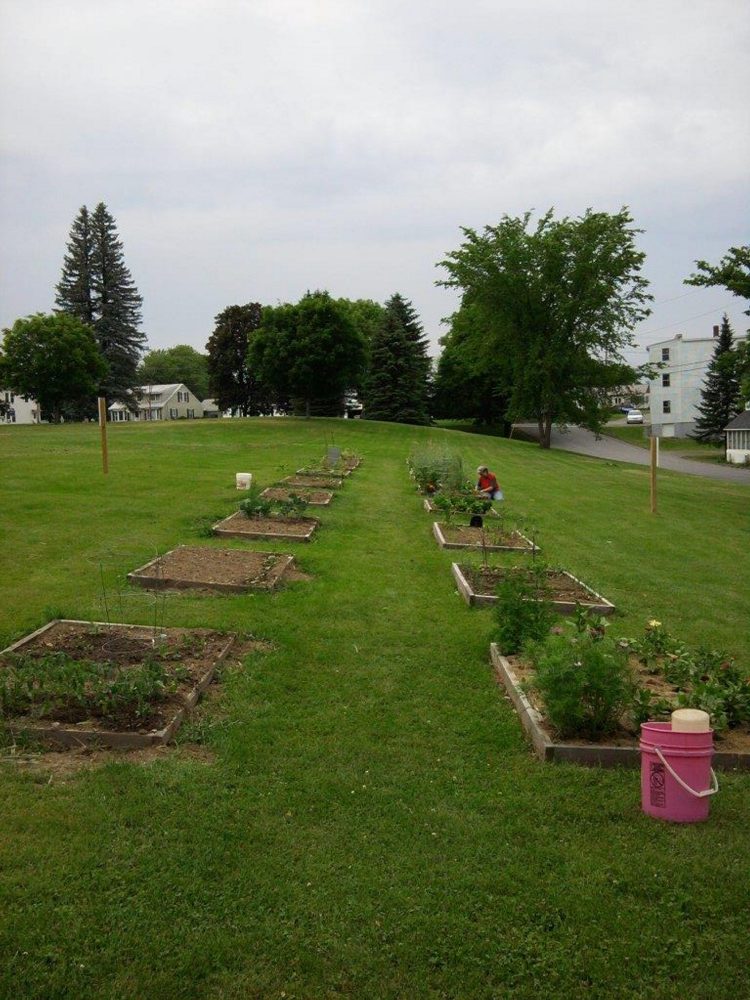WINSLOW — After it was built seven years ago, the town’s community garden received so many requests that they had to add more beds.
Over time, though, the garden has fallen out of use.
The new director of Parks and Recreation, Amanda McCaslin, hopes to change that trend and turn the area on Dallaire Street into one of the busiest spots in town this spring and summer. Her plan: hold talks and classes there while improving the garden infrastructure.
McCaslin said she will invite master gardeners and people who work at Johnny’s Selected Seeds in Winslow to give talks and classes at the garden throughout the summer. Her department already held a seed starting class with Johnny’s on March 28, which 12 people attended.
“There’s definitely a need in the town of Winslow,” McCaslin said.
The Parks and Recreation Department also received a $5,000 grant from Johnny’s Selected Seeds this year to install a small shed and hose system at the site to replace a barrel filled with water, which is what gardeners used before to water crops.
According to agricultural experts, vibrant community gardens can provide a number of a benefits to the towns they serve. Some real estate studies even show an increase in tax revenue in some cities.
“Any activity you can give the town to get together is great,” McCaslin said.
Nearby Waterville has two community gardens, on North and Moore streets, which started with waiting lists, Parks and Recreation Director Matt Skehan said. However, interest has tailed off “quite dramatically” in the last three years, he said.
“I don’t know what to attribute it to,” Skehan said. “There’s a lot of energy and enthusiasm around growing.”
One issue that could have frustrated growers is stealing, he said, which has been prevalent in both locations. While the department has put up signs at one of the gardens, Skehan said it’s difficult to prevent.
McCaslin also said that stealing is “probably the hardest thing to combat.” She plans to raise money over time to build a fence around the garden to prevent stealing, and she also hopes that making the area active will keep potential garden thieves at bay.
The Sustain Mid-Maine Coalition first worked with resident Kate Newkirk, among others, to build the garden in 2010. They picked the site on Dallaire Street because it had open space and has good sun exposure, Heavener said. The garden was built in the fall and the town began leasing lots in the spring of 2011.
While Town Manager Michael Heavener said he couldn’t find information on its initial cost, he said the coalition provided some financial support.
The 4-feet-by-8-feet beds cost $10 to lease, all of which goes to sustaining the garden. The department has sold about one-quarter of the 30 available beds over the last few years, McCaslin said.
“My goal is to fill them all,” she said. On Friday, 17 beds had been sold.
McCaslin is hoping to attract even more people to the area, which is next to a playground, with educational programs. She hopes that by revitalizing the garden, the surrounding area will follow suit, she said.
“The playground is a beautiful playground, but it doesn’t seem to be used as much as it could be,” McCaslin said. “That park had graffiti in it. It didn’t seem to be used by kids.”
The empty community garden isn’t helping the situation, she said. “The more people are at a place, the nicer it gets,” McCaslin said. “Bringing vegetables to life brings an area to life.”
Community gardens may even affect property values in some places. According to a 2008 study by the American Real Estate and Urban Economics Association, a garden in New York City can raise neighborhood property values by up to 9.4 percent within five years of opening. Another study in Milwaukee found that the average garden gave the city about $9,000 in tax revenue each year.
Beyond economic benefits, community gardens also provide opportunities for people to grow produce who may live in apartments or areas with little land, as well as a place to socialize.
While Heavener said Winslow did not see an effect on property values, he thinks the garden is good for the town because it offers a place for people to get together.
Amy Witt, a horticulturist with the Cooperative Extension at the University of Maine based in Cumberland, said gardens can build a sense of community.
“They get to meet neighbors and people they wouldn’t necessarily meet,” she said, adding that they are popular in Cumberland County towns.
Richard Kersbergen, a professor for the extension in Waldo, said gardens create an important system of support, as people are asking each other for advice.
“It can build a lot of camaraderie between gardeners,” he said.
Some gardens set aside lots for the Harvest for Hunger program, which donates produce to those in need, as there is a “real need for fresh produce” now, Witt said.
Madeline St. Amour — 861-9239
mstamour@centralmaine.com
Twitter: @madelinestamour
Send questions/comments to the editors.




Success. Please wait for the page to reload. If the page does not reload within 5 seconds, please refresh the page.
Enter your email and password to access comments.
Hi, to comment on stories you must . This profile is in addition to your subscription and website login.
Already have a commenting profile? .
Invalid username/password.
Please check your email to confirm and complete your registration.
Only subscribers are eligible to post comments. Please subscribe or login first for digital access. Here’s why.
Use the form below to reset your password. When you've submitted your account email, we will send an email with a reset code.